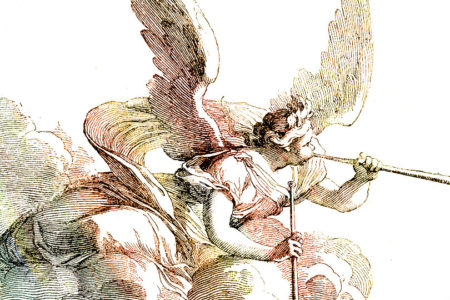The Unbroken Line
Even the most unlikely situation can become a vehicle for God’s grace, as it did with Tamar.
The story of Tamar as recorded in Genesis 38 is both sordid and tragic.
Many readers consider the narrative indecent, and some even suggest it should never be read in public. No matter how we look at it, we know God included it in Scripture for a reason.
MORE JEWISH CULTURE AND CUSTOMS
Get a glimpse of Jewish life in More Jewish Culture and Customs by Steve Herzig.
Tamar lived in the era before God gave the Mosaic Law, in a society dominated by strict family tribal rules and pre-Levirate customs. If a woman’s husband died without offspring, his brother was to marry her to produce a son as the legal heir of the deceased husband. Around this custom, which later became part of the Mosaic Law, revolves Tamar’s story.
It is one of rejection, radicalism, and righteousness. Her in-laws rejected her; she acted radically to gain that which was rightfully hers; and in the end, she was deemed righteous.
Many view Tamar as a woman of integrity because she risked her life to fulfill her duty to herself and her family. However, she unwittingly performed an even more important task. God used her to preserve the Messianic line because, without the birth of her son Perez, the line from Judah to David would have been broken.1
Rejection
The Bible’s account begins after Judah, one of Jacob’s 12 sons, moved to the Canaanite royal city of Adullum. There he married a Canaanite woman named Shua, and she bore him three sons: Er, Onan, and Shelah (Gen. 38:1–5).
Judah arranged for Er, his eldest son, to marry Tamar. At some point, Er behaved wickedly before the Lord, so the Lord killed him (vv. 6–7). In accordance with a Levirate-marriage custom, Judah instructed his second son, Onan, to marry Tamar so he could produce an heir for Er. But Onan, knowing the child would not be his legally, refused. So the Lord killed him also (vv. 8–10).
Then Judah told Tamar to return to her parents’ home and remain a widow until his third son, Shelah, became old enough to marry. But fearing he might lose his youngest son as well, Judah rejected Tamar in his heart and had no intention of keeping his promise to give her Shelah.
Tamar, however, believed Judah and obediently returned to her father’s home (v. 11). She remained faithful to the restrictions placed on her and awaited the fulfillment of her legal right to bear children in Judah’s family.
Radicalism
Years passed, Shelah reached marrying age, and still Judah made no plans for him to marry Tamar. Realizing Judah had lied to her, Tamar became desperate and devised a radical plan.
She received word that Judah was traveling to the city of Timnah with his friend Hirah the Adullamite to supervise the shearing of his sheep. (Judah’s wife had died, and his time of mourning for her was complete.) So Tamar disguised herself as a prostitute, veiled her face, and sat by the entrance gate of the town (vv. 12–14).
As expected, Judah noticed her and solicited her services, not knowing she was Tamar. He promised to send her a goat for payment and granted her request to leave his signet, cord, and staff as collateral (vv. 15–18).
Tragically, Judah apparently failed to see the significant connection to his past conduct. Tamar probably knew Judah’s father (Jacob) had deceived his father (Isaac) to obtain the blessing that rightfully was his (27:18–24). And she probably knew about Judah’s role in tricking Jacob into believing a wild beast had devoured Jacob’s youngest son (Joseph) when, in reality, Judah and his brothers had sold Joseph into slavery. That deception, too, involved a goat and a personal item—Joseph’s “tunic of many colors” (37:31–35).
Galatians 6:7 warns, “Do not be deceived, God is not mocked; for whatever a man sows, that he will also reap.” Judah had sown deception, and he was about to reap deception.
Judah slept with Tamar, and she became pregnant. After their encounter, she returned home, removed her veil, and again wore her widow garments. When Judah sent his friend to deliver the goat and retrieve his personal items, Tamar was nowhere to be found; and no one knew of any prostitutes in the area. Judah told Hirah to forget the matter and let the woman keep the objects to avoid further humiliation (Gen. 38:18–23).
Righteousness
Three months later, someone told Judah Tamar was pregnant. Infuriated, he demanded, “Bring her out and let her be burned!” (v. 24).
As they dragged her out, she sent a message to Judah: “By the man to whom these belong, I am with child….Please determine whose these are—the signet and cord, and staff” (v. 25).
Hebrew scholars have interpreted Tamar as saying, “I beg of thee, discern the face of thy creator and hide not thine eyes from me,” appealing to Judah to judge honestly before God and to seek her welfare. The sages observed she could have pointed to Judah in front of his peers and declared, “He made me pregnant!”
Instead, by presenting Judah’s items and not mentioning his name, Tamar showed her willingness to die rather than shame him publicly, revealing her righteous demeanor (cf. Talmud Sotah 10b). Judah acknowledged Tamar had acted more righteously than he. “She has been more righteous than I, because I did not give her to Shelah my son,” Judah said (Gen. 38:26).
The Jewish sages believed the account reflected well on Judah, since he eventually confessed his sin against Tamar: “Since Judah confessed to his error sincerely, this is a sign of righteousness and so the story of Tamar is read and explained” (Mishnah Megillah 4:10; cf. Gen. 38:26). Other people have different views. However, there can be no doubt that God shed His grace on Tamar because she gave birth to twin boys, Perez and Zerah, from whom came King David and then Jesus (Ruth 4:18–22; Mt. 1:3, 16).
Tamar may not have understood all the divine promises associated with Judah’s family. But she understood her right to remarry, bear children, and partake in Judah’s heritage. Although rejected by Judah, she sought inclusion with Israel. Perhaps unaware, she was indeed “standing on the promises of God.” And God accepted her.
Generations later, when Boaz was about to marry Ruth the Moabitess in a Levirate marriage, the elders of Bethlehem gave him this blessing: “May your house be like the house of Perez, whom Tamar bore to Judah, because of the offspring which the LORD will give you from this young woman” (Ruth 4:12). Tamar had become associated with God’s blessing.
Despite the dubious method used, the incident demonstrates God’s perfect management of the Messianic line. The rabbis taught that when Tamar asked Judah for his signet, cord, and staff, she spoke prophetically. The signet expressed the many kings who would descend from the line of Judah and Tamar. The cord suggested the authority that would be exhibited by Israel’s many rulers. And the staff signified the coming of the King-Messiah through their lineage.
Genesis 49:10 predicted the Messiah would come through the tribe of Judah: “The scepter shall not depart from Judah, nor a lawgiver from between his feet, until Shiloh comes; and to Him shall be the obedience of the people.”
Though we would not prefer an incident like this one to be associated with God’s people—let alone the Savior of the world—the account of Judah and Tamar provides a glimpse of God’s amazing graciousness and goodness. “The LORD is good to all, and His tender mercies are over all His works” (Ps. 145:9).
Endnote
- John W. Reed, “Ruth,” The Bible Knowledge Commentary, ed. John F. Walvoord and Roy B. Zuck (Wheaton, IL: Victor Books, 1985), 1:416.








